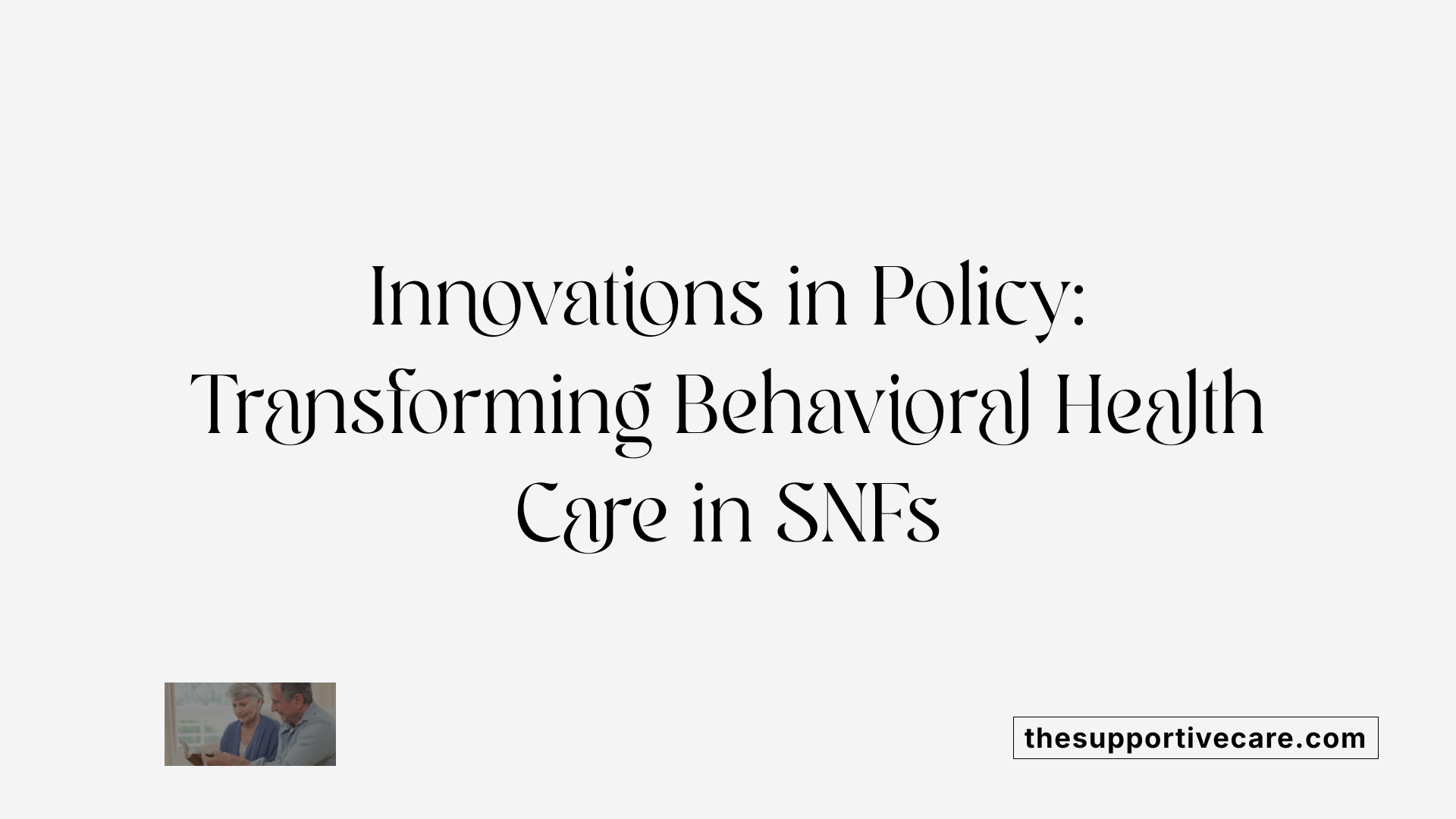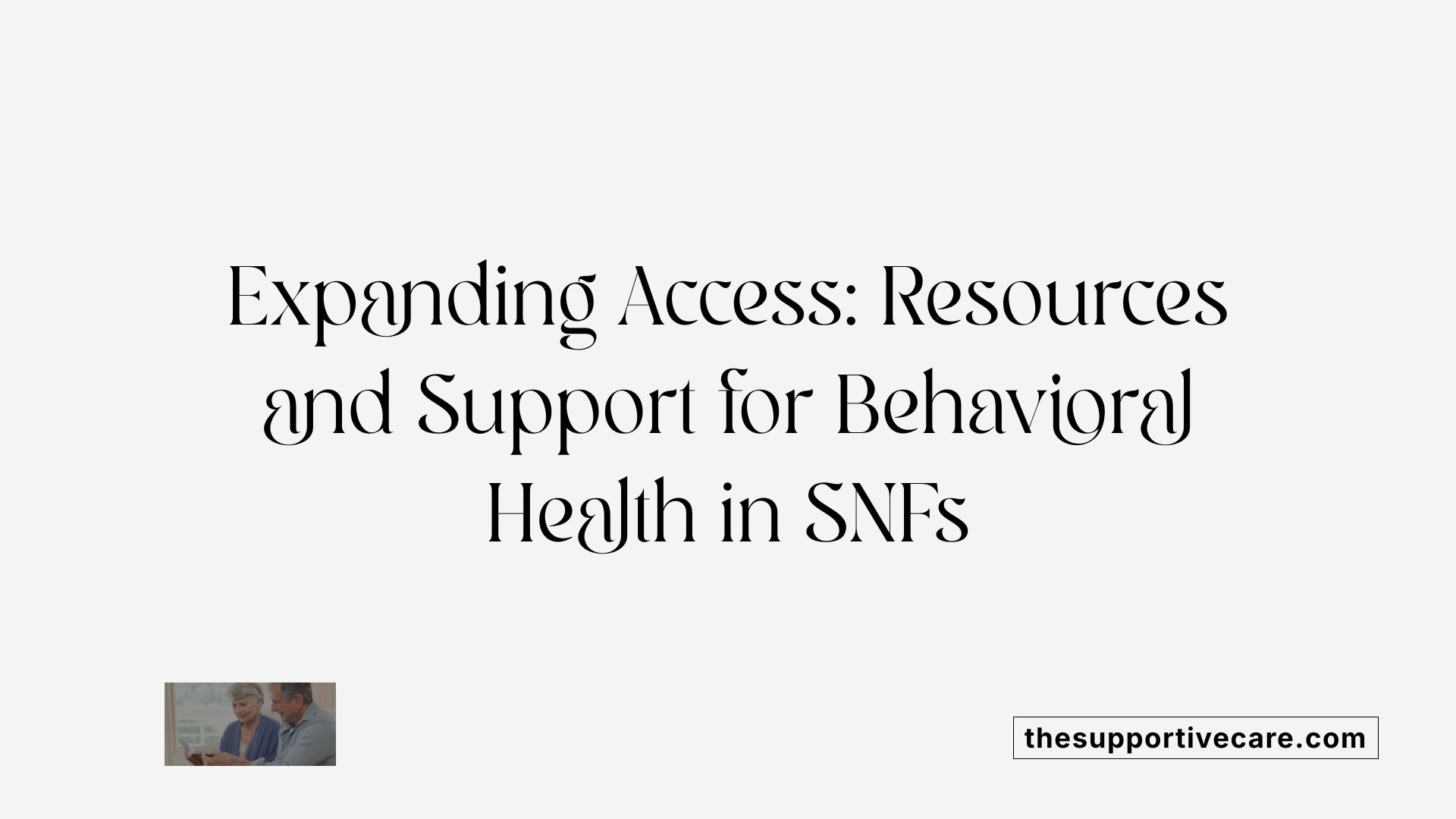Understanding Behavioral Health Challenges in Skilled Nursing Settings
Skilled nursing facilities (SNFs) face significant challenges in managing behavioral health issues, including substance use disorders (SUD) and other mental health conditions. As the population ages, the complexity and prevalence of these disorders among residents increase, necessitating comprehensive, evidence-based approaches tailored to this vulnerable group. This article explores common behavioral health challenges in SNFs, reviewing current treatment practices, barriers to care, regulatory developments, and innovative solutions aimed at improving outcomes for residents living with mental health and substance use issues.
Prevalence and Complexity of Behavioral Health Conditions in Skilled Nursing Facilities
What Are Common Behavioral Health Challenges Faced in Skilled Nursing Facilities?
Up to 90% of residents in skilled nursing facilities (SNFs) experience some form of mental health condition. These commonly include mild depression and anxiety, serious mental illness (SMI), and dementia combined with psychiatric comorbidities. This broad range of disorders represents a significant challenge for care providers.
How Prevalent Are Mental Health Conditions Among SNF Residents?
Mental health issues are widespread in nursing facilities, affecting the vast majority of residents. The high prevalence demands comprehensive behavioral health services tailored to older adults' complex needs.
What Is the Impact of Substance Use Disorders (SUD) on Older Adults in Nursing Facilities?
Substance use disorders are increasingly affecting older adults, with evidence showing rising use of alcohol, opioids, stimulants, and cannabis. Opioid overdose mortality in this group has more than tripled over the last two decades. SUD significantly worsens health outcomes for residents by increasing risks.
How Do Behavioral Health Challenges Affect Comorbidities and Geriatric Syndromes?
Behavioral health problems compound medical complexity in older adults. SUD and mental health disorders contribute to higher rates of physical comorbidities and geriatric syndromes, escalating mortality risk. These intertwined challenges demand vigilant screening, coordinated care, and specialized treatment strategies within SNFs.
Comprehensive Treatment Services for Substance Abuse and Mental Health Issues in SNFs
What are comprehensive treatment services for substance abuse and mental health issues?
Comprehensive treatment services for substance abuse and mental health conditions combine integrated approaches that address both issues simultaneously. These services rely on medical care, counseling, psychotherapy, and medication management tailored to individual patient needs.
Integrated treatment approaches
Skilled nursing facilities often employ models like the Minnesota model, therapeutic communities, and outpatient programs. These approaches blend medical treatment and psychosocial support, allowing residents to receive care that addresses physical, psychiatric, vocational, and social challenges, fostering recovery and relapse prevention.
Medical care, counseling, and medication management
Treatment teams include psychiatrists, psychologists, social workers, and nurses who provide a multidisciplinary, coordinated approach. Services may involve inpatient rehabilitation or outpatient care, counseling and therapy sessions, and medication-assisted treatment such as methadone, buprenorphine, or naltrexone to decrease substance use and improve outcomes.
Specialized treatment models and multidisciplinary teams
Residents benefit from programs designed for various populations, including older adults, women, and minorities, that ensure culturally appropriate and effective care. Multidisciplinary teams collaborate on individualized treatment plans, addressing complex medical and behavioral health needs including geriatric syndromes and co-occurring disorders.
Medicare coverage for behavioral health services
Medicare supports these comprehensive services through various parts: Part A covers inpatient care including skilled nursing facility stays; Part B funds outpatient services, including behavioral health counseling and screenings; and Part D helps with prescription medications for mental health and substance use disorders. This coverage improves accessibility and continuity of care in nursing facilities.
| Treatment Component | Description | Role in SNFs |
|---|---|---|
| Integrated Treatment | Combines medical, psychological, and social treatment | Addresses complex co-occurring disorders holistically |
| Medical Care | Psychiatric evaluation, medication-assisted treatment | Manages physical and mental aspects of SUD and comorbidities |
| Counseling and Psychotherapy | Individual and group therapy | Supports behavioral change, relapse prevention, emotional health |
| Specialized Treatment Models | Tailored care for elderly, women, minorities | Ensures appropriate services matching resident characteristics |
| Medicare Coverage | Covers inpatient, outpatient, medications, preventive care | Facilitates access and continuity of behavioral health services |
These comprehensive services are essential to improve health outcomes and quality of life for nursing facility residents living with substance use and mental health disorders.
Addressing Various Forms of Addiction through Evidence-Based Treatment
How do treatment services address various forms of addiction?
Treatment for addiction incorporates a wide array of evidence-based approaches tailored to individual needs. Behavioral therapies, such as cognitive-behavioral therapy (CBT), contingency management, motivational enhancement therapy, and 12-step facilitation, play a central role in helping patients modify harmful behaviors and develop coping strategies.
Medication-assisted treatment (MAT) is also critical, employing medications like methadone, buprenorphine, and naltrexone to reduce withdrawal symptoms and cravings, which supports sustained recovery.
Care is delivered across multiple levels depending on patient needs, including detoxification, inpatient rehabilitation, intensive outpatient programs, and standard outpatient care. This spectrum allows proper matching of treatment intensity with medical and psychosocial requirements.
Individualized care plans target multiple challenges faced by individuals with substance use disorders, integrating behavioral and pharmacologic therapies, addressing co-occurring mental health conditions, and providing vocational and legal support where needed.
Support systems are integral to treatment success. Peer support groups, family involvement, and community resources strengthen recovery efforts.
Relapse prevention strategies are emphasized through education on trigger recognition and craving management, improving long-term outcomes and maximizing life functioning.
Together, these components form comprehensive treatment frameworks that adapt to the complex needs of nursing facility residents and other populations affected by addiction.
Barriers to Effective Substance Use Disorder Care in Skilled Nursing Facilities
Resource limitations and staffing challenges
Most nursing facilities face significant resource shortages that undermine their ability to deliver evidence-based substance use disorder (SUD) care. High staff turnover rates disrupt continuity of care and strain the remaining workforce, limiting the facility's capacity to manage complex SUD cases effectively.
Training deficits and lack of incentives
A pervasive lack of training leaves nursing staff ill-equipped to handle the nuances of SUD treatment. Without adequate incentives or support for professional development, staff engagement in SUD care remains low, which further compromises treatment quality.
Financial and reimbursement obstacles
Financial challenges are a major barrier. Nursing facilities encounter difficulties due to disparities between Medicare and Medicaid reimbursement rates. Medicare generally offers higher reimbursement, making facilities prefer residents covered by Medicare over those with SUD often reliant on Medicaid. This dynamic results in selective admissions practices that exclude many residents with substance use disorders.
Stigma and discriminatory admission practices
Stigma against patients with substance use disorders plays a critical role in limiting access to quality care. This discrimination can lead to patients being admitted primarily to lower-quality nursing homes or experiencing longer hospital stays. Consequences include increased healthcare costs, disruptions in treatment continuity, and poorer overall health outcomes for these vulnerable populations.
Collectively, these barriers contribute to inadequate SUD care in skilled nursing facilities, which exacerbates patient risk and inflates healthcare expenditure. Addressing these issues requires comprehensive strategies targeting staffing, training, financial structures, and stigma reduction to improve access and quality of care for nursing home residents with substance use disorders.
Regulatory and Policy Innovations Supporting Behavioral Health in Skilled Nursing Facilities

What regulatory and policy innovations improve SUD care in nursing facilities?
Several state-led initiatives are shaping the landscape of substance use disorder (SUD) care in nursing facilities by offering financial incentives and technical assistance. States such as Massachusetts and Connecticut have pioneered programs that provide Medicaid add-on payments to facilities enhancing SUD treatment access. These states also support mobile or satellite opioid treatment programs designed to reach residents who otherwise face barriers to care.
On the regulatory front, significant changes have reduced barriers to effective SUD treatment. The elimination of the X waiver requirement for buprenorphine prescribing allows more clinicians to initiate lifesaving medication-assisted treatment (MAT) without cumbersome certification processes. Additionally, new regulatory flexibilities permit telehealth assessments for SUD, expanding access to behavioral health providers especially important in nursing facilities that face staffing challenges.
Efforts to streamline methadone access continue, with ongoing advocacy for permitting pharmacy dispensing and reducing DEA restrictions, which could simplify delivery of this essential medication for opioid use disorder (OUD).
Broader reform proposals focus on improving the financial and quality incentives for SUD care in nursing homes. These include increasing Medicaid and Medicare reimbursement rates specifically for SUD services, expanding the types of providers eligible to bill for such care, and integrating SUD-specific quality metrics within existing facility assessment systems. These metrics aim to make SUD treatment outcomes more visible and directly tied to reimbursement, encouraging facilities to elevate care standards.
Together, these policy innovations reflect a multidimensional approach – combining financial support, regulatory simplification, and quality measurement – to address longstanding challenges and improve substance use disorder care for vulnerable nursing facility residents.
Integrating Behavioral Health Services: Multisector and Telehealth Approaches

How are multisector collaboration and telehealth advancing behavioral health care in SNFs?
Cross-agency collaboration is playing a vital role in enhancing behavioral health care within skilled nursing facilities (SNFs). Agencies that oversee aging, Medicaid, and behavioral health services work together to improve care coordination and service delivery. Notable examples of such collaboration come from states like New Jersey and Oklahoma, where structured inter-agency efforts have optimized behavioral health outcomes for residents.
In addition to multisector collaboration, tele-behavioral health (TBH) and consultation models are expanding access to mental health providers for SNF residents. Programs such as Project ECHO use telehealth technology to overcome geographic and logistical barriers while reducing costs of care. These models allow specialists to support frontline clinicians remotely, improving service availability in facilities that might otherwise lack onsite behavioral health expertise.
States are also leveraging policy tools and funding mechanisms, including the Money Follows the Person (MFP) program, to strengthen the behavioral health workforce. MFP supports transitions from institutional settings to community living and has been used alongside pilot programs and statewide initiatives to enhance workforce capacity and provide targeted training.
Quality improvement and resident outcomes are closely monitored using comprehensive data sources. Evaluation tools such as the Preadmission Screening and Resident Review (PASRR), the Minimum Data Set (MDS) behavioral health items, and the Certification and Survey Provider Enhanced Reports (CASPER) help identify behavioral health needs within SNFs. This information guides policy adjustments and incentivizes facilities to improve care standards.
Together, multisector collaboration, telehealth innovations, workforce enhancement, and data-driven quality monitoring form a holistic approach to integrating behavioral health services in nursing facilities, ultimately benefiting residents with complex behavioral health needs.
Specialized Behavioral Health Programs for Vulnerable Populations in SNFs
How do skilled nursing facilities address behavioral health needs of special populations?
Skilled nursing facilities (SNFs) recognize the importance of specialized behavioral health programs designed to meet the unique needs of vulnerable populations such as elderly residents, women (including pregnant women), adolescents, and minorities. These programs tailor treatment approaches to effectively address the complexities associated with co-occurring mental health and substance use disorders often seen in these groups.
Tailoring treatment to unique needs
Specialized programs in SNFs focus on individualized treatment planning, adjusting care methods to accommodate specific clinical, social, and cultural factors. For example, programs designed for pregnant women prioritize safe pregnancy practices alongside substance use disorder (SUD) treatment, while services for adolescents emphasize developmental and psychological considerations. Similarly, programs tailored for minority populations incorporate culturally sensitive interventions to increase treatment engagement and effectiveness.
Addressing co-occurring disorders and trauma
Many residents in these populations experience co-occurring psychiatric disorders and trauma histories. SNFs integrate trauma-informed care techniques with evidence-based psychosocial interventions and medication-assisted treatment (MAT) to support recovery. This comprehensive approach aids in reducing symptoms, promoting coping strategies, and preventing relapse, thereby improving overall health and quality of life.
Outcomes improvement and safety considerations
Behavioral health programs for vulnerable populations emphasize dignity and safety, ensuring residents’ rights to respectful and confidential treatment are upheld. Facilities implement strict safety standards, including routine training for staff on trauma-informed practices and prevention of abuse. Continuous quality improvement measures monitor program effectiveness, aiming to enhance recovery outcomes and foster social reintegration.
These specialized behavioral health initiatives contribute significantly to improving care quality and resident well-being within skilled nursing facilities.
Patient Rights, Quality Assurance, and Ethical Standards in Behavioral Health Treatment
What patient rights and quality assurance measures govern behavioral health treatment in SNFs?
In behavioral health treatment within skilled nursing facilities (SNFs), licensed programs must uphold clients' rights to dignity, safety, and confidentiality. Facilities provide clients with a bill of rights that details these protections, ensuring respectful treatment and clear access to information about available treatment options.
Staff qualifications are strictly regulated, requiring personnel—including licensed professionals and counselors—to receive annual training to maintain competency in delivering care. This ongoing education supports high-quality service and patient safety.
Programs are mandated to enact continuous quality improvement policies. State oversight bodies monitor compliance to preserve program integrity and ensure effective care delivery. Safety standards govern the use of restraints and seclusion, mandating immediate reporting of any incidents to prevent abuse and protect residents.
Ethical standards extend to marketing and advertising by treatment providers, who must maintain accuracy, transparency, and completeness. Violations may result in fines, license revocations, and legal claims from affected individuals, reinforcing protections against misleading practices.
Together, these patient rights and quality assurance measures establish a framework that supports ethical, safe, and effective behavioral health treatment within nursing facilities, safeguarding vulnerable populations and promoting sustained recovery.
Role of Primary Care and Ongoing Support in Behavioral Health Management within SNFs
What Is the Role of Primary Care and Ongoing Support in Behavioral Health Management in Skilled Nursing?
Primary care clinicians play a critical role in managing behavioral health within skilled nursing facilities (SNFs). They are responsible for early screening and diagnosis of substance use disorders (SUD) and mental health conditions among residents. This early identification allows timely referral to specialized behavioral health services, ensuring residents receive the care they need.
Coordination is vital. Primary care providers work closely with behavioral health specialists and peer support programs to deliver integrated and continuous care tailored to each resident's needs. This collaboration helps maintain treatment consistency and promotes recovery.
A major focus of treatment is relapse prevention. Programs prepare patients by teaching them to recognize triggers and develop coping skills to manage cravings effectively. By combining pharmacotherapy with psychosocial support, ongoing care maximizes residents' overall life functioning and reduces substance misuse.
To aid clinicians and program planners, a wealth of educational resources and technical guidance is available. Platforms such as FindTreatment.gov offer updated, evidence-based materials on treatment options and care standards, facilitating confident decision-making in behavioral health management. These resources support the delivery of high-quality, patient-centered care in nursing facilities, ultimately improving resident outcomes and quality of life.
Resources and Support Systems to Enhance Behavioral Health Treatment Accessibility

What resources and support systems exist to improve behavioral health treatment access in SNFs?
FindTreatment.gov, a government-funded platform by SAMHSA, is a central resource designed to improve access to behavioral health treatment. This platform offers regularly updated information on treatment options, including medication-assisted treatments like buprenorphine and methadone for opioid addiction. It also connects users with confidential helplines such as the 988 Suicide & Crisis Lifeline and the National Helpline, which provide emergency support for mental health and substance use crises.
Educational resources on FindTreatment.gov cover addiction as a chronic disease, treatment expectations, and advice on managing treatment costs. These materials are particularly useful for skilled nursing facilities (SNFs) developing or expanding comprehensive substance use disorder (SUD) programs.
Beyond this platform, clinicians and administrators have access to extensive evidence-based practice manuals. These include treatments for opioid use disorder, psychosocial and trauma-informed care approaches, and integrated models for co-occurring disorders. Crisis services and peer support tools are also available to address urgent needs effectively.
Community-based workforce expansion strategies are crucial to increasing behavioral health service capacity. Programs focus on training, recruitment, and the integration of telehealth technologies to extend specialist reach into nursing facilities, reducing barriers related to staffing shortages and geographic limitations.
These varied resources collectively empower SNFs to enhance their behavioral health treatment accessibility, ensuring residents receive informed, evidence-supported care while navigating complex challenges in staffing and financing.
Future Directions: Enhancing Behavioral Health Care in Skilled Nursing Facilities

Expanding treatment capacity and workforce training
To address the growing behavioral health needs in skilled nursing facilities (SNFs), expanding treatment capacity is crucial. States are leveraging policy tools such as workforce training initiatives and pilot programs to improve care quality. For instance, the Money Follows the Person program supports transitions from institutional care to community living while enhancing workforce capabilities through statewide education partnerships. Cross-agency collaborations among aging, Medicaid, and behavioral health entities bolster care coordination and service delivery, exemplified by successful models in states like New Jersey and Oklahoma.
Incorporating technology and digital therapeutics
Technology plays a growing role in behavioral health care for SNF residents. Tele-behavioral health (TBH) initiatives reduce logistical barriers by allowing remote consultations and ongoing support, improving access especially in underserved areas. Projects like Project ECHO demonstrate the power of teleconsultation for specialist guidance. Moreover, digital therapeutics and trauma-informed care models are increasingly utilized, contributing to evidence-based, innovative care approaches tailored to residents' complex needs.
Strengthening cross-sector collaboration and policy reforms
Future enhancements depend on robust policy reforms that improve care incentives and infrastructure. Increasing Medicaid and Medicare reimbursement rates specifically for substance use disorder (SUD) treatment encourages facilities to accept and adequately care for residents with SUD. Expanding provider eligibility for reimbursement ensures a broader range of clinicians participate. Moreover, incorporating SUD-specific quality metrics into SNF assessment systems fosters accountability and continuous improvement.
Focusing on individualized quality metrics and payment incentives
Developing individualized treatment plans supported by precise quality metrics will drive improvements in behavioral health outcomes. Facilities benefit from payment models that reward specialized services, such as fee-for-service rate add-ons and acuity-based reimbursements. Such incentives promote adoption of evidence-based practices and culturally competent care, enhancing resident safety and recovery prospects.
Collectively, these future strategies emphasize expanding workforce skills, embracing technology, fostering collaborations, and reforming payment and regulatory frameworks. This comprehensive approach is vital to sustainably improve behavioral health care quality in skilled nursing environments, addressing complex resident needs with dignity and efficacy.
Advancing Behavioral Health Care in Skilled Nursing Facilities
Skilled nursing facilities are at the forefront of addressing complex behavioral health challenges among a medically vulnerable population. Despite existing barriers such as resource limitations, stigma, and regulatory hurdles, ongoing policy innovations, state-led initiatives, and evidence-based treatment approaches provide a pathway toward improved care. Integration of comprehensive treatment models, multidisciplinary collaboration, expanded workforce capacity, and patient-centered quality assurance measures are essential to meet the growing behavioral health needs within SNFs. Leveraging technology, enhancing reimbursement systems, and emphasizing individualized care will be pivotal in transforming behavioral health services, ultimately enhancing quality of life and clinical outcomes for residents.
References
- Improving Access To Substance Use Disorder Care In ...
- Mental health & substance use disorders
- Chapter 5—Specialized Substance Abuse Treatment Programs
- FindTreatment.gov: Home
- New California Mental Health and Addiction Treatment Laws
- State Strategies to Enhance Behavioral Health Care in ...
- Evidence-Based Practices Resource Center



































































































